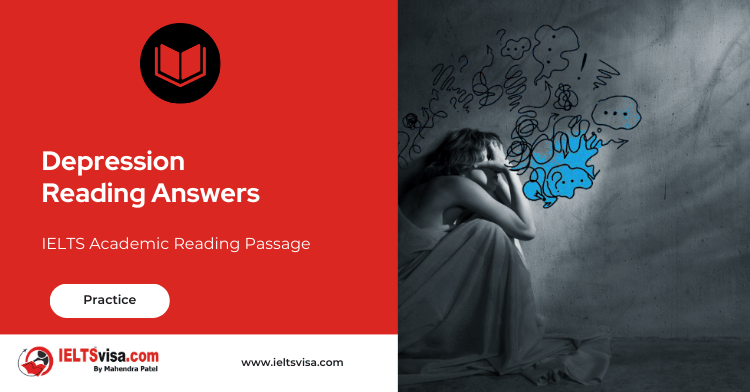Depression Reading Answers
IELTS Academic Reading Passage
Section A – It is often more difficult for outsiders and non-sufferers to understand mental rather than physical illness in others. While it may be easy for us to sympathise with individuals living with the burden of a physical illness or disability, there is often a stigma attached to being mentally ill, or a belief that such conditions only exist in individuals who lack the strength of character to cope with the real world. The pressures of modern life seem to have resulted in an increase in cases of emotional disharmony and government initiatives in many countries have, of late, focussed on increasing the general public’s awareness and sympathy towards sufferers of mental illness and related conditions.
Section B – Clinical depression, or ‘major depressive disorder’, a state of extreme sadness or despair, is said to affect up to almost 20% of the population at some point in their lives prior to the age of 40. Studies have shown that this disorder is the leading cause of disability in North America; in the UK almost 3 million people are said to be diagnosed with some form of depression at any one time, and experts believe that as many as a further 9 million other cases may go undiagnosed. World Health Organisation projections indicate that clinical depression may become the second most significant cause of disability on a global scale by 2020. However, such figures are not unanimously supported, as some experts believe that the diagnostic criteria used to identify the condition are not precise enough, leading to other types of depression being wrongly classified as ‘clinical’.
Section C – Many of us may experience periods of low morale or mood and feelings of dejection, as a natural human response to negative events in our lives such as bereavement, redundancy or breakdown of a relationship. Some of us may even experience periods of depression and low levels of motivation which have no tangible reason or trigger. Clinical depression is classified as an on-going state of negativity, with no tangible cause, where sufferers enter a spiral of persistent negative thinking, often experiencing irritability, perpetual tiredness and listlessness. Sufferers of clinical depression are said to be at higher risk of resorting to drug abuse or even suicide attempts than the rest of the population.
Section D – Clinical depression is generally diagnosed when an individual is observed to exhibit an excessively depressed mood and/or ‘anhedonia’ – an inability to experience pleasure from positive experiences such as enjoying a meal or pleasurable social interaction – for a period of two weeks or more, in conjunction with five or more additional recognised symptoms. These additional symptoms may include overwhelming feelings of sadness; inability to sleep, or conversely, excessive sleeping; feelings of guilt, nervousness, abandonment or fear; inability to concentrate; interference with memory capabilities; fixation with death or extreme change in eating habits and associated weight gain or loss.
Section E – Clinical depression was originally solely attributed to chemical imbalance in the brain, and while anti-depressant drugs which work to optimise levels of ‘feel good’ chemicals – serotonin and norepinephrine – are still commonly prescribed today, experts now believe that onset of depression may be caused by a number, and often combination of, physiological and socio-psychological factors. Treatment approaches vary quite dramatically from place to place and are often tailored to an individual’s particular situation; however, some variation of a combination of medication and psychotherapy is most commonly used. The more controversial electroconvulsive therapy (ECT) may also be used where initial approaches fail. In extreme cases, where an individual exhibits behaviour which indicates that they may cause physical harm to themselves, psychiatric hospitalisation may be necessary as a form of intensive therapy.
Section F – Some recent studies, such as those published by the Archives of General Psychiatry, hold that around a quarter of diagnosed clinical depression cases should actually be considered as significant but nonetheless ordinary sadness and maladjustment to coping with trials in life, indicating that in such cases, psychotherapy rather than treatment through medication is required. Recovery as a result of psychotherapy tends, in most cases, to be a slower process than improvements related to medication; however, improvements as a result of psychological treatment, once achieved, have been observed in some individuals to be more long term and sustainable than those attained through prescription drugs. Various counselling approaches exist, though all focus on enhancing the subject’s ability to function on a personal and interpersonal level. Sessions involve encouragement of an individual to view themselves and their relationships in a more positive manner, with the intention of helping patients to replace negative thoughts with a more positive outlook.
Section G – It is apparent that susceptibility to depression can run in families. However, it remains unclear as to whether this is truly an inherited genetic trait or whether biological and environmental factors common to family members may be at the root of the problem. In some cases, sufferers of depression may need to unlearn certain behaviours and attitudes they have established in life and develop new coping strategies designed to help them deal with problems they may encounter, undoing patterns of destructive behaviour they may have observed in their role models and acquired for themselves.
Question 1 – 5
Reading Passage 1 has seven parts, labelled A to G.
Write the correct letters A–G on your answer sheet next to 1–5.
Which paragraph has the information below?
- Details of treatment alternatives for worst-case scenario depression __________ .
- Information regarding cases where drug treatment is inappropriate __________.
- Details of how those diagnosed with depression may be more vulnerable than other members of society _________.
- Information about society’s attitudes to depression and similar illnesses_______.
- Information regarding why estimates of the incidence of future growth in cases may be overly exaggerated __________.
Question 6 – 8
Choose THREE letters A-G.
Write your answers in boxes 6-8 on your answer sheet.
(NB, Your answers may be given in any order)
Q) Which THREE of the following statements are true of depression?
A. Governments have generally failed to take action to educate the general public about the condition.
B. The highest reported number of cases is in the USA.
C. In Britain, it is likely that there are more individuals who live with the condition without the help of a doctor than those being officially treated.
D. Clinical depression may be triggered by divorce.
E. Lethargy may be one of the symptoms of depression.
F. Prescribed pharmaceuticals have radically changed over recent years.
G. Approaches to treating depression are not universal.
Question 9 – 13
Complete the summary of paragraphs F and G with the list of words A-L below.
Write the correct letter A-L in boxes 9-13 on your answer sheet.
Whilst recovery through counselling rather than medicine may be more 9.________________ , results once achieved may have more 10. ________________ with some patients. Counselling sessions are geared towards improving the subject’s relationship with others and their own 11._______________, encouraging sufferers of depression to take on a more 12. _______________ outlook. The extent to which genetic disposition and sociological factors impact on state of mind is 13._________________. Many people undergoing counselling therapy do so with the purpose of unlearning negative behaviour and reactions.
| A | gratifying |
| B | longevity |
| C | ambition |
| D | optimistic |
| E | pessimistic |
| F | difficulty |
| G | inconclusive |
| H | self-image |
| I | gradual |
| J | unequivocal |
| K | immediate |
| L | categorical |

Solution For: Depression
Reading Answers
| 1 – E | 8 – G |
| 2 – F | 9 – I |
| 3 – C | 10 – B |
| 4 – A | 11 – H |
| 5 – B | 12 – D |
| 6 – C | 13 – G |
| 7 – E |
Review and Practice
- Regularly practice with IELTS reading samples and time yourself to get used to the pressure of the exam.
- Review your mistakes to understand where you went wrong and how to avoid similar errors in the future.
Our Books
Master IELTS Speaking Part 1
IELTS Writing Task 1 Book
IELTS Writing Task 2 Book
Depression Reading Answers Explanation
Comin Soon
Practice IELTS Other Modules
IELTS Listening
The IELTS Listening test assesses how well you can understand spoken English in various contexts. It lasts about 30 minutes and is divided into four sections with a total of 40 questions. The listening tasks become increasingly difficult as the test progresses.
IELTS Academic Reading
The IELTS Academic Reading section assesses your ability to understand and interpret a variety of texts in academic settings. It is designed to evaluate a range of reading skills, including skimming for gist, reading for main ideas, reading for detail, understanding inferences, and recognizing a writer's opinions and arguments.
IELTS Speaking
The IELTS Speaking test assesses your ability to communicate in English on everyday topics. It lasts 11-14 minutes and consists of three parts: introduction, cue card, and a discussion based on the cue card topic.
IELTS General Reading
IELTS General Reading tests your ability to understand and interpret various types of texts. Here are some key areas and types of content you can expect to encounter in the reading section, along with tips for effective preparation.
IELTS Academic Writing Task 1
In IELTS Academic Writing Task 1, you are presented with a visual representation of information, such as graphs, charts, tables, or diagrams, and you are required to summarize, compare, or explain the data in your own words.
IELTS General Writing Task 1
In IELTS General Writing Task 1, you are required to write a letter based on a given situation. The letter can be formal, semi-formal, or informal, depending on the prompt. Here’s a breakdown of the key components to include in your letter
IELTS Academic Writing Task 2
In IELTS Academic Writing Task 2, you are required to write an essay in response to a question or topic. Here’s a guide to help you understand the essential elements of this task
IELTS Exam Tips
To succeed in the IELTS exam, practice regularly, familiarize yourself with the test format, improve your vocabulary, develop time management skills, and take mock tests to build confidence.
Grammer for IELTS
Grammar is the foundation of effective communication in English. Understanding tense usage, subject-verb agreement, and sentence structure enhances clarity and coherence in writing and speaking.
Vocabulary for IELTS
Vocabulary plays a crucial role in the IELTS (International English Language Testing System) exam, especially in the Speaking and Writing sections. Here’s an overview of why vocabulary is important and how it impacts your performance
RECENT IELTS SAMPLES QUESTIONS AND ANSWERS
Walking with dinosaurs
Peter L. Falkingham and his colleagues at Manchester University are developing techniques that...
Money as the Unit of Amount Reading Answers
The most difficult aspect of money to understand is its function as a unit of account. In...
WEATHERING IN THE DESERT
In the deserts, as elsewhere, rocks at the earth's surface are changed by weathering, which...
Nature on Display in American Zoos
The first zoo in the United States opened in Philadelphia in 1874, followed by the Cincinnati...
Can We Prevent the Poles From Melting
Such is our dependence on fossil fuels, and such is the volume of carbon dioxide we have...
Air conditioning the earth reading answers
The circulation of air in the atmosphere is activated by convection, the transference of heat...













